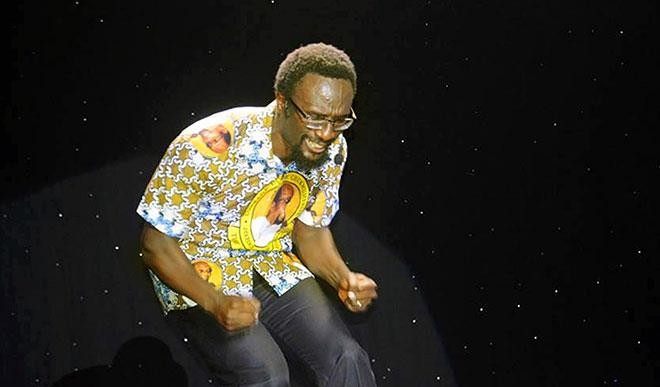Poetry, Dike Chukwumerije and the audacity of a dream
In Abuja, where top comedians and music acts need expensive television and radio promotions to attract patronage for their shows, a man-Dike Chukwumerije-driven by sheer will and with much less resources sells poetry shows with ease. Last year, Sheraton’s Ladi Kwali’s was filled with a thousand and more people who believed that performance poetry was […]


In Abuja, where top comedians and music acts need expensive television and radio promotions to attract patronage for their shows, a man-Dike Chukwumerije-driven by sheer will and with much less resources sells poetry shows with ease. Last year, Sheraton’s Ladi Kwali’s was filled with a thousand and more people who believed that performance poetry was something to pay for. Many years ago, the idea of performance poetry let alone paying to watch one would have been thought mundane. Today, however, the Night of the Spoken Word Series has become an annual staple in Abuja.
In a pitch dark hall where only the stage lights twirl, Dike’s poems play mind games with the breath of the audience. Their pulse, rising and falling, as the pitch of his voice slam across the room, mediated sometimes by the sound of gongs, the konga, and the beating of the poet’s own heart against the microphone. While Dike may have chosen to be a lawyer, destiny chose him to be a poet. A calling he’s pursued with a degree of loyalty that can be likened to Okigbo’s commitment to the river goddess-Idoto. Who needs a courtroom when he can have one all to himself; him as the accused-standing to defend his talent, and the audience as the Judge and Jury. And in that box, on stage, Dike entertains, dances, gyrates, roaring with words, telling stories, to an ecstatic crowd, visibly thrilled by his emphatic displays.
Earlier in April this year, at the Creative Industries Conference and Expo hosted by the British Council & Nigerian Ministry of Information and Culture, Dike brought the entire hall to meditative quietness when he detailed his initial struggles with the concept. It was so difficult, he recounted, to convince people on why they should care to sit at a place watching or listening to a poetry performance. And when they eventually came, some would scoff at it, some would sneer, and you the performer will catch the eyes of some others who genuinely do not want to be there. In moments like this, the first instinct is often to assume that wider promotion will make the show gain traction. But people are only interested in the things that they like. And so Dike knew that more than promotion, he needed to get people to like spoken word poetry.
The first big challenge was how to attract more of the non-literary crowd, ordinary people who have no predisposition to poetry but who may nonetheless find it promising. By starting out with free shows, he was able to target and draw in this crowd. Importantly, as a more diverse crowd began to trickle into the fold, he focused on upgrading the content of the show. It was no wonder, instead of simply seeing poets on stage with only the energy of their voices or movement, one began to see the energy of sounds, soundtracks, instruments, deployed strategically, merging or collapsing with words, turning spoken words into something more grand and edifying.
Dike, it would appear, have had to reinvent himself as much as his content. Somehow, it may have occurred to him that if people had to part with as much as five or ten thousand naira of their money, they had to be treated to a real show. The energy of his own performances is rapt, the audience are held spellbound-as they watch the intersection of poetry and body movements. Trained in professional Taekwondo, Dike’s body language accentuates the emotions in his words and creates an uncommon appeal. The stage itself has a creative force of its own. The lights, their dims and glows form part of the creative process, with the poet, strutting gallantly as the lights zoom in or around him. On there, he pours himself in his words. To be in the audience is to see yourself in in those words. Dike’s words are all that we are and see around us: government, family, kids, community, love, heartbreak, hope, redemption and loss. Each line is powerful, haunting, and carefully delivered in spurts and bursts of flowery language. And for a minute you wish those moments could go on for ever.
As I ponder today on the upcoming edition of the Night of the Spoken Word (NSWP7) on this year’s Independence Day, I am forced to remember the success of last year’s edition. I remember a man who abandoned law for art, and with very limited resources transformed a marginal show into an entertainment delight. I remember a show, once offered to people for free now had 1,400 people paying to watch. I remember Dike losing his father few months to last year’s performance, and yet, on stage, at the appointed time, one saw a man who had converted the despair of loss into a creative energy that was both wistful and endearing. In the poem titled ‘Uche’ first name of his late father, Dike chanted of the man’s greatness; that, even in bemoaning loss, death seemed less like loss and more like triumph. Dike’s Night of the Spoken Word is one of Nigeria’s ignored success stories, one that reminds us that there are no obstacles capable of withstanding the audacity of a dream; especially, one so patiently and resolutely pursued.
Okorie is of the Michael Okpara University of Agriculture, Umudike
